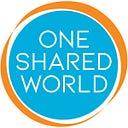Youth Leadership is the Key to Global Pandemic Recovery
The COVID-19 pandemic has confirmed that our current world order cannot withstand crisis. The global distribution of power is too uneven to provide a stable foundation for recovery from this crisis and any future ones that might arise. Economic inequality is rampant, and set to worsen. Billions of lives are in thrall to ineffective national and global leadership.
To recover from the COVID-19 crisis, we need new global leadership. Expanding the responsibility and resources available to youth is a centerpiece of sustainable recovery. One Shared World’s campaign, Rise or Fall Together: Protecting the World’s Most Vulnerable Populations in this Time of Global Crisis, makes the case for a COVID-19 recovery plan that centers around youth empowerment.
Young people are already proving their capacity to lead. Throughout the pandemic, they have demonstrated a remarkable ability to build coalitions from a distance. Armed with the power of social media, they banded together to protect vulnerable groups from the consequences of the shutdown. The Quarantined Student-Youth Network in Bengal, India says it has delivered tens of thousands of meals to people facing hunger during lockdown. Students across the United States formed mutual aid funds after their campuses closed in March to protect low-income peers from food and housing insecurity. After public schools closed, college and high school students from New York to Boston to California created free tutoring programs.
More broadly, online youth activism has flourished in the stay-at-home era. Young people are the primary stakeholders in the enterprise of building a better future, and they are driven to work for one. They were crucial in organizing what may be the largest civil rights movement in United States history, and raised so much money online for local nonprofits across the country that certain organizations redirected donors elsewhere. They circulate daily infographics on their Instagram pages instructing each other on how to take action against human rights abuses and humanitarian crises across the globe, from Yemen to China to the United States border.
With little funds and few resources, young people are already changing the world from their own homes and neighborhoods. We propose a three-part strategy to bolster their efforts: provide financial support to youth-led initiatives, formalize a community of youth leaders, and solicit young input at all levels of global decision-making.
Investing in young people means giving them economic power. Our report proposes directly supplementing the income of the hundreds of millions of people living in extreme poverty or in danger of falling into it over a half-year recovery period. This strategy works best in conjunction with broader investments into local communities: repairing infrastructure, building schools, providing employment programs, teaching human rights, pursuing social justice initiatives and expanding press freedoms and the flow of information through low cost internet connectivity. In the coming months and years, these types of investments will prepare the world to emerge from crisis.
International aid organizations should not simply take it upon themselves to decide what each community needs most. Instead, post-pandemic recovery efforts should also direct funding to multi-generational local groups and social entrepreneurs, many of whom have conceived of innovative ways to fulfill the urgent and long-term needs of their communities simultaneously. Take Green Treasures Farm in Kenya, for example, which equips women and youth with sustainable skills like water harvesting and conservation. The organization was founded by Kaluki Paul Mutuku, a member of the African Youth Initiative on Climate Change (AYICC) who grew up watching women walk miles to fetch water for their families.
While investing in existing organizations is an efficient way to allocate recovery resources, we should also work to encourage new initiatives that respond to post-pandemic reconstruction needs. A new International Youth Corps initiative, based on national models in countries like Kazakhstan, India, Singapore, and Nigeria, could recruit motivated young people to invest small grants into their communities with the support of a national network of volunteer mentors. They could consult with other Youth Corps members tackling similar development problems to share strategies and insights.
These Youth Corps members could form an official advisory board for the United Nations, working together on a periodic basis to formulate reports about the state of global development from a youth perspective. Granting young people a seat at the table ensures that long-term goals, like fighting climate change, don’t fall by the wayside as we tackle immediate problems.
Young people are not just the leaders of the future––they are the leaders of the present. Adding your voice to the Rise or Fall Together campaign will help us demand that global leaders equip young people with the power to make the changes for which they are fighting.
Rick Barton, the author of Peace Works, teaches at Princeton and was the US Ambassador to the Economic and Social Council of the UN, Assistant Secretary of State and Deputy High Commissioner for refugees at the UN. Tarana Sable is a junior at Brown and a Managing Editor of the Brown Political Review. Tianna Herman is a Rhodes College Alumna and a Master of Science in Public Health Candidate at the Bloomberg School of Public Health.
